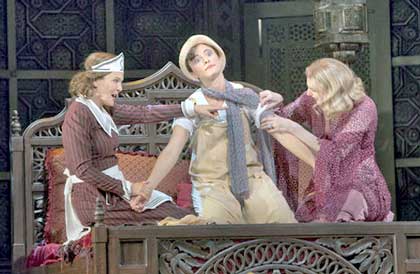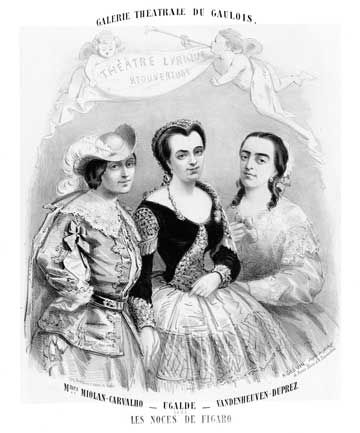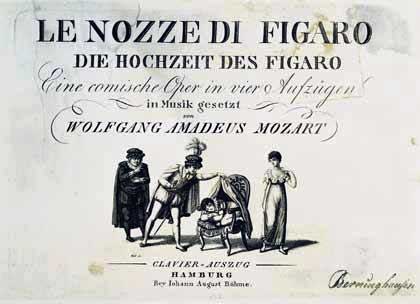Opera (1786)
Music by Wolfgang Amadeus Mozart
Libretto by Lorenzo da Ponte
Conductor: James Levine
Production: Sir Richard Eyre
Metropolitan Opera
New York, NY
Live in HD
Set and Costume Designer: Rob Howell
With Ildar Abdrazakov (Figaro), Marlis Petersen (Susanna), Joh Del Carlo (Doctor Bartolo), Susanne Mentzer (Marcellina), Isabel Leonard (Cherubino), Peter Mattei (Count Almaviva), Greg Fedderly (Don Basilio), Amanda Majeski (Countess Almaviva), Philip Cokorinos (Antonio), Ying Fang (Barbarina), Scott Sculy (Don Curzio)

Isabel Leonard as Cherubino
Amanda Majeski as Countess Almaviva
in “Le Nozze di Figaro”
Photo: Ken Howard/Met Opera
Count Almaviva (Peter Mattei) has a nice wife, Countess Almaviva (Amanda Majeski), but that doesn’t keep him from trying to get in the pants of her adorable maid, Susanna (Marlis Petersen), and numerous other women. Susanna is happily engaged to Figaro (Ildar Abdrazakov), a man to the Count, and wants both to avoid the unwelcome seduction and to stay in the good graces of her employers. Complicating things are the attentions of Cherubino (Isabel Leonard), a young man with eyes for all women, but, in particular, for the Countess. With a lot of cross-dressing and role playing by Cherubino, Susanna and the Countess, the Count gets shown up and those who should get married, or stay married, do.

There are few works that are perfect manifestations of genius, and this is one of them. Not only is Mozart’s incredibly inventive and nuanced composition on view in aria after aria but da Ponte’s incredibly fun, subtly complex and heartfelt libretto gives Mozart the perfect template for everything that comes out.

This new production is set in the 1930s rather than in the 1700s as it usually is, and it really works. The costumery and style of a roguish lord of the manor in the jazz era in Spain fits very well. There is something accessible about the kind of indulgent richesse in that era that make the Count’s shenanigans slip believably into it.
The beautifully constructed cast seemed to be having a great time during this performance, and it is clear that director Richard Eyre and conductor James Levine worked tirelessly with them to create not only a musically gratifying experience but a superbly acted one.
Peter Mattei creates a Count who is both a callow slimebag whose soul is not totally lost, likable in a distant way. It’s a perfect stance for this role, and Mattei, with his deep, creamy voice and playful arrogance pulls it off well.
Amanda Majeski, in her glistening Met debut run as the Countess, has a kind of quiet intensity that rides through the storm of infidelity with obvious pain but also with dignity which she conveys vocally with warmth and passionately sweet anguish.
Marlis Petersen is a charmingly lyrical Susanna, full of clean-cut Nordic flair, while Ildar Abdrazakov’s Figaro is appropriately crafty and vocally appealing. They are well matched, their combined voices vivid and resonant.
The striking standout in this excellent lineup is Isabel Leonard as Cherubino. Her acting is so good, so delightfully varied and funny, her singing is so hauntingly rich, that she lights up an already very bright production. One marvels at her dual capacity to ham up this role so intelligently and to produce such a sonorous and lilting sound. Watching her play a young man dressed up as, and trying to move like, a woman is a real scream. She is an amazing talent, delightful to watch and to listen to.
Costumes for the production by Rob Howell are a great evocation of the era, and, with all the cross-dressing, serve to suit up all the different roles superbly well.
Though it’s hard to really tell the native quality of the music over the electronics of Live in HD, there is every indication that James Levine delivered his typical musical marvels. Reports from interviews with singers also indicated that he was very engaged, along with director Richard Eyre, in details of the acting. The incredibly integrated complexity of music and action was evident throughout, a clear testament to that brilliant collaboration.

Delphine Ugalde as Suzanne
Caroline Duprez-Vandenheuvel as La Comtesse
in “Les Noces de Figaro” (1858)
a French adaptation of
“Le Nozze di Figaro”
– BADMan

Leave a Reply